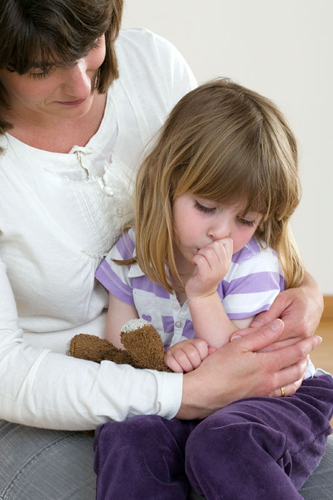Parenting trends and expert opinions come and go as
society changes, and every generation of parents wants to do things
“better.” In reality, however, children’s needs and wants remain
unchanged. The challenge is to listen to the combined wisdom of the
“experts” and decide what is right for your child.
“Avoid making unfair comparisons between children; each is unique and has their own needs.”
“Appropriate
behavior and healthy emotional development in toddlers is the result of
sensitive, loving, and responsive parenting, regardless of their
temperament, and how like or unlike you they seem to be.”
Most parents and
child-care professionals now support the idea of child-centered
parenting. This means looking closely at your child’s behavior and
attempting literally to see the world from her perspective. For example,
kneel down and look at the room from your child’s point of view and ask
yourself, “How does the world look at her level?” Consider whether or
not it is a comfortable, safe, and exciting view. Your new perspective
will help you to understand her needs and behavior.
The child-centered
approach doesn’t mean that your toddler is the most central person in
your family unit and that you should give her everything she wants, on
demand. It means helping her to understand what she is experiencing and
gradually to develop frustration tolerance. This approach will encourage
your child to learn: with your guidance and through her own experience.
This approach is at the heart of developing self-esteem.
Her view of the world
Try to put yourself in your child’s shoes and see the world from
her viewpoint. This will help you to understand her behavior and why she
sometimes gets frustrated.

Getting to know her
Don’t always assume your child is being deliberately awkward—she
may simply act in a certain way because her temperament is different
than yours.

Child-centered parenting
At the heart of child-centered parenting there are four important principles. It should:
Highlight
the rights of children alongside the rights of parents, but should
rebuff the belief that children are the property of their parents.
Be positive and reinforcing as much as possible, rather than using threats and punishment.
Focus on the needs and best interests of children and recognize the significance of the parents’ role.
Encourage
a view of the parenting role as positive, enjoyable, and fulfilling
while acknowledging that it can be challenging and difficult.
Child-centered
parenting recognizes the importance of boundaries and guidelines in
curbing behavior problems. Frustration-tolerance is an important skill
for children to learn so they can develop self-control and accept social
boundaries.
Temperament and personality
"“I sometimes wonder
whether our son was swapped at birth with another child! He is so full
of energy and bounce, and quite unlike his brother and sister at the
same age.”" There are times when every parent wonders, “How can I have
produced a child whose character seems so different than my own?” A
conservative and calm couple may be surprised by having a creative live
wire of a child; an extroverted couple may find their child is born shy
and cautious. How dull it would be if we were all the same! Our
essential nature is known as our temperament. It is a part of what
becomes our personality, and it is uniquely our own. Temperament is a
behavioral style that influences the way we think and respond, and is
one of the reasons that two siblings with essentially the same
upbringing may respond differently to the same parenting approach.
Linked to our
genes, our basic temperament is largely mapped out before birth, but may
be modified by later life experiences. It is possible to see individual
differences in babies while still in the womb in terms of how they
respond to temperature change, noise, stimuli, and in their level of
activity.
If temperament is what
we are born with, you may wonder what difference parenting makes. How
can the style of upbringing influence personality? Whereas initial
temperament remains constant, the development of a child’s personality
is much more complex.
Personality is influenced by:
Personality develops
over many years, into our twenties and beyond, as we learn and respond
initially to our parents and home environment, and later to broader
social and life experiences. Your child’s personality will also be
influenced by how others—especially you—respond to the things she says
and does.
For example, a shy child
who has an anxious temperament may withdraw from new experiences. As
she grows, however, she will learn to adapt and acquire a level of
tolerance, if her parents gently and repeatedly introduce her to new
situations. While never likely to become an extrovert, as a growing
child she will be better able to manage than if her parents were to
interpret the anxiety as distress and constantly protect her from new
experiences, which would instead reinforce the anxiety.
How parents react to,
and label, their child’s behavior depends not so much on the behavior
itself, as on their view of that behavior. For example, in a family that
admires individuality, a boisterous youngster may be called independent
or strong-willed or “just like me” with some admiration; whereas in a
family that prefers a greater level of conformity, the child may be seen
as “difficult” or stubborn. Similarly, a child may be described
positively as calm or content in a family that does not enjoy
disruption, or passive in one that is more extroverted.
How you view
and respond to your child’s temperament depends on your expectations,
demands, and perceptions of what your child should be like. A poor “fit”
can lead to a period of tension and stress while you “get to know” your
child’s nature and response. It is important for you to understand your
own temperament, as well as your toddler’s, in order to respond to her
in a positive way, regardless of expectations.
Our genes and temperament (hereditary factors).
Our learned responses to our upbringing and life in general.
How others respond to us (which affects our behavior).
Our broader physical and social environment.